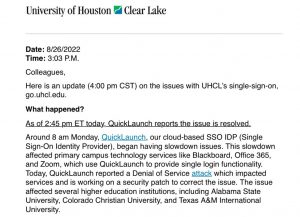EDITORIAL: Go.UHCL’s failure spotlights UHCL’s ongoing issues
The first weeks of school are never easy. However, a well-functioning university should ensure it makes students’ first weeks of school as easy as possible.
UHCL’s administration and Office of Information Technology (OIT) unfortunately failed in this avenue. On the first day of the semester, Go.UHCL experienced outage issues that were not resolved until Aug. 29.
Go.UHCL’s provider QuickLaunch experienced a denial of service attack, which caused Go.UHCL’s inaccessibility. Such attacks led to students, staff and faculty losing access to Outlook, Blackboard, Zoom and other systems provided through Go.UHCL. This is not the first time Go.UHCL experienced such issues. Students faced multiple obstacles with Go.UHCL during spring 2022 midterms.
Technological disruptions are a normal experience at any institution, and while Go.UHCL’s impairment came as a result of the attack on QuickLaunch, Go.UHCL’s failure on the first day of classes represents consistent problems the university faces when it comes to situations that affect the community.
UHCL has a history of lacking in adequate contingency planning and communication, and Go.UHCL’s failure the first week of school fully encapsulated this.
Timely communication continues to be an issue for UHCL
This is not the first time the university had a problem communicating to its students and the overall community.
It is true students were sent an email by OIT’s Senior Associate Vice President LeeBrian Gaskins Aug. 23 at 10:43 a.m. alerting them to the Go.UHCL issues. However, there is little excuse for why the university could not send a text message to students, utilizing the text alert system already in place. Why have such a system if it is not used for such situations?

To only send an email not only limits students’ ability to know about an issue, but also shows a lack of consideration since students use Go.UHCL to check their email in the first place.
Additionally, the university did not even manage to do the bare minimum of posting to its social media accounts about the situation. OIT was the only UHCL entity providing any communication about the issue. On Aug. 22, while students, staff and faculty received the first email about Go.UHCL’s failure, the university tweeted twice, once at 9:30 a.m. and again at 3:02 p.m. Neither tweets were about the crash. When students received an email from Gaskins about Go.UHCL on Aug. 23., UHCL was tweeting that it is not too late to register for fall 2022 courses.
What reason does the university have to not let students know through social media or text message that the university’s single sign-on was experiencing issues? Technological issues are a normal and inevitable occurrence, but the university has a responsibility to communicate to the community that such issues are happening rather than leaving its students in the dark.
The university and its many departments have multiple modes of communication and to hardly use any is inexcusable.
UHCL needs better contingency planning
While tech issues are inevitable, a public, government-funded institution like UHCL should have contingency plans in place to be better prepared for situations like this. UHCL is dependent on technology. If plans are not in place for when technology fails, the institution is doing a disservice to its students.
Better practices must be in place so that classes can continue when Blackboard and other services are down.
It is true OIT had plans in place for a Quick Launch service disruption. OIT implemented a defederation, which allowed the UHCL community access Blackboard and other systems after the denial of service attack. However, it is obvious the rest of the university did not have plans in place, otherwise there would have been immediate communications deployed about this issue across multiple mediums and faculty would not have had to scramble to provide basic course information to students. Unfortunately, this was not and has not been the case.
College deans and faculty should ensure they have the necessary files and documents available for class beyond Blackboard and other services that may malfunction. One department alone should not be depended on to respond and inform when these situations happen. There needs to be a pre-existing university-wide plan in place to handle and inform the community about such a situation – from administration to academic affairs to student affairs and so forth.
OIT implemented Go.UHCL to make students’ experience on campus easier. However, the multiple failures of Go.UHCL at critical points in the semester leave much to be desired. As UHCL continues to grow and utilize new services like Go.UHCL, difficulties and growing pains are expected. But the university risks bad, or nonexistent, communication being what students expect from an entity that has all the resources needed to provide the exact opposite to its community.
CORRECTION 9/19/2022:
This editorial has been updated to reflect that although QuickLaunch announced it resolved the issue Aug.23, Go.UHCL resumed normal operations Aug. 29.

